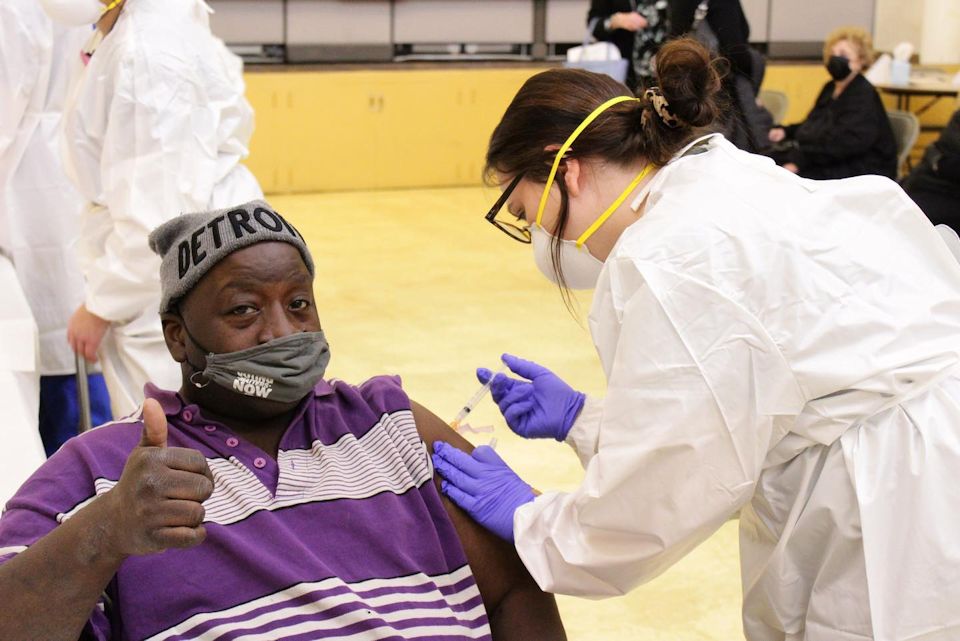Bishop David Bard thanks church leaders for their patience and careful planning for the common good as a corner is turned in the pandemic.
Dear Friends in Christ in the United Methodist churches of Michigan,
Greetings to you in the grace of our Lord Jesus Christ, the love of God, and the peace and power of the Holy Spirit.
Since March 2020, I have written often about the coronavirus pandemic and COVID-19. We have been on quite a journey together as we work in ministry for Jesus Christ under conditions we scarcely could have imagined just last year. As ever, I am deeply grateful for your creativity, your persistence, your courage, and your patience as we have navigated such uncharted waters.

Today I celebrate that we have arrived at an important turning point in our fight against the coronavirus and COVID-19 here in the United States. With increasing numbers of persons receiving vaccinations and the cooperation of so many to maintain mitigation measures while vaccines were being administered, case rates for COVID are declining, as are hospitalizations and deaths. This is good news, and news we must hold together with the reality that this is a global pandemic and other parts of the world have not yet reached such a turning point.
We need to remember that “this virus loves nothing more than to find a large group of unvaccinated, unmasked human beings among whom it can dance and hop from person to person and go wild” (Dr. Nancy Kass). Most recently, we’ve witnessed the devastation wrought by the coronavirus pandemic in India.
Yet here in the U.S., we’ve arrived at a new place. The CDC has issued new guidelines stating that fully vaccinated people can safely interact with others both indoors and outdoors without wearing masks. The science around the coronavirus suggests that outdoor transmission is a very low risk overall and that fully vaccinated people are both protected against severe disease and present little risk of transmitting the virus. What might this mean for our churches and ministries?
As I have maintained throughout this pandemic, as followers of Jesus, we should act in ways that promote public health, foster the common good, and care for the well-being of others. We do this in the name and Spirit of Jesus, this Jesus who told us to love our neighbor as we love ourselves (Mark 12:31) and invited us to care for the least of these (Matthew 25:45). I want to again thank you for all that you have done these past months to promote public health, foster the common good, and care for the well-being of others while staying in ministry for Jesus. What might this ask of us now?

If you have not yet been vaccinated, get vaccinated. The guidance for engaging with others without masks is only for those who have been fully vaccinated. Encourage others to get vaccinated. Help others find vaccinations and locate transportation to receive them.
Compose well-considered plans for how you will gather and keep such plans thoughtful and flexible. How and when you gather should continue to be based on solid local community health information. What is the test positivity rate? Ideally, we want to achieve a positivity rate below 5%. What is the case rate in your area? A case rate of over 25 new daily cases per 100,000 people is considered the highest risk level. What is the vaccination rate in your area, and how widely have the vaccines been made available.
As I write this, about 40% of the U.S. population is fully vaccinated. That means 60% are not, and vaccines have only recently been made available for those 12 to 15 years of age. Vaccines for children under 12 are not yet available. You will want to consider who is likely to gather at your church when you think about when and how to gather.
As you make your plans for gathering, consider how you will invite persons to continue to use mitigation measures like mask-wearing, hand washing, and social distancing. Dispensing with masks for outdoor gatherings seems prudent given the medical evidence, though unvaccinated people mitigate their risk by continuing to wear a face covering even outdoors.
Increased use of outdoor space for gathering makes good sense when the weather permits. When gathering indoors, you may want to consider continuing with an indoor mask requirement depending on the vaccination rate for your congregation and community. Unvaccinated people should continue wearing masks indoors. As a gesture of hospitality, having masks available for people at your church is a sign of caring. Singing with masks is safer than singing without them. As vaccination rates increase and vaccines are available to more and more people, some mitigation measures can be relaxed. Even as masks become more optional, remember always to treat those who choose to mask with kindness. You do not know their medical situation or their life experience. Someone wearing a mask does you no harm and may be protecting you from getting sick.
If you are still wondering what may be most helpful at this particular time, a number of public health experts and other denominational leaders are encouraging consideration of “the 2/3 rule.” The 2/3 rule says that public gatherings are safest when they meet two of three criteria: masked, distanced, and outdoors. Again, as vaccination rates increase, this rule can be relaxed, but it is not a bad starting point at this time.
One other thing we have learned throughout this time is the vital importance of handwashing and sanitizing. Our facilities should have soap available in restrooms and hand sanitizer widely available throughout. Clean hands stop the spread of viruses. So, too, does staying home when you are sick.

Even as plans are made to gather again, be gracious in offering options for those who continue to choose to connect with your faith community virtually. Just because you’ve opened again for in-person worship does not mean everyone will deem it safe to return, particularly those with younger children. Don’t forget that you may also have connected with new persons online who want this to remain their primary connection to your church. We should not think about returning to something that once was, but rather take what we have learned and build something new, something that combines the best of in-person and virtual connections. We need to become both/and churches.
Even as we plan for an emerging reality that is freer of the threat of the coronavirus, we need to remember that while we are turning a corner now, there may yet be setbacks. As long as this virus finds human hosts throughout the world, it has the opportunity to change, and new variants against which our current vaccinations may be less effective could arise—another reason to get vaccinated. Continue to pay attention to public health news and guidance.
Finally, let me again encourage deep patience among us. As your church leaders make plans and decisions, know they are doing their best to further the church’s ministry while caring for others in love. Your viewpoint may not always win the day, and when it doesn’t, please be gracious. Wouldn’t it be awful to arrive at the other side of this pandemic, when we can again open our buildings freely and fully with less concern for the coronavirus, only to find that the church community to which we wanted to return and into which we wanted to welcome others has been significantly diminished because of conflict over decisions made, decisions only intended to reflect love and care?
I remain grateful for the thoughtful and careful ways you have made decisions about ministry during this pandemic. I appreciate your ongoing desire to act in the interest of public health, the common good, and the well-being of others, all in the spirit of Jesus. Thank you and thanks be to God, who, in Jesus Christ, has been our companion along the way.
Bishop David A. Bard
Michigan Area, United Methodist Church
Last Updated on September 20, 2022

